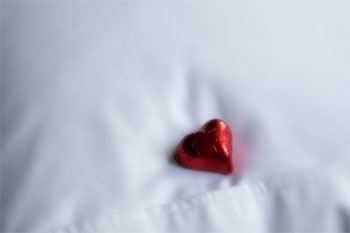The link between a common sleep disorder and heart disease

Link Between Sleep Apnoea and Heart Disease
Sleep apnoea is a common sleep disorder. But did you know it can dramatically increase your risk of heart disease? Given that heart disease is the number-one killer of women in Australia, this is something you need to know about. Let's start with the basics.
What is sleep apnoea?
Sleep apnoea is a common, but potentially serious, sleep disorder in which you have one or more pauses in breathing (or shallow breaths) while you sleep. These pauses can last for several seconds and can happen multiple times in an hour or throughout the night.
Many people think only men who snore get sleep apnoea. It's true that many – but not all – people with sleep apnoea are snorers (and often loud ones!), but women are just as likely to suffer from it, especially if they're overweight.
The main cause of sleep apnoea is being overweight. However, studies have found an increase of sleep apnoea in women around perimenopause, regardless of their age or weight.
There are a few different types of sleep apnoea, but the most common type is called obstructive sleep apnoea (OSA) and occurs when the throat muscles relax and block the airways.
How is sleep apnoea detected?
Many people with sleep apnoea feel very tired and often have difficulty staying awake in the day, without knowing why they are so tired.
This is the tricky aspect of sleep apnoea – you may not know you have it. The main features of sleep apnoea generally occur while you're asleep and unaware of what's happening, so it's usually a family member or bed partner who might be the first to notice the signs and witness your changes in breathing.
How is sleep apnoea linked with heart disease?
The pauses in breathing that occur in OSA can cause sudden drops in oxygen levels in the blood. These sudden drops can strain the cardiovascular system and increase the risk of high blood pressure, which is one of the major risk factors in developing heart disease.
Alarmingly, research has found that OSA increases the risk of heart failure by 140%, the risk of stroke by 60%, and the risk of coronary heart disease by 30%. In fact, researchers estimate that untreated sleep apnoea may increase the risk of death from heart disease by up to five times.
Researchers haven't entirely figured out the exact links between OSA and heart disease, but they believe that changes to the nervous system, lung pressure and inflammation as a result of the sleep apnoea may play a part.
Unfortunately, as well as heart disease, sleep apnoea can increase the risk of other chronic diseases such as type 2 diabetes, metabolic syndrome, liver problems and increases the risk of complications from medications and surgery.
When to see a doctor
If you experience, or if your bed partner notices, any of the following signs, see your GP:
Shortness of breath, gasping for air, or choking that wakes you up from sleep
Snoring loud enough to regularly disturb the sleep of others or yourself
Excessive daytime sleepiness and unexplained fatigue; tiredness that may cause you to fall asleep while working, watching television or even driving.
If you doctor suspects sleep apnoea, you will likely be referred for a sleep study – a test used to help diagnose sleep disorders. In some cases, a sleep study can be carried out at home.
There are a variety of ways to treat and manage sleep apnoea and the treatment prescribed will largely depend on the type of sleep apnoea and how severe it is. It's important to bear in mind that, in some cases, managing sleep apnoea can be a long-term commitment. However, if the benefits are better sleep, more energy and potentially reducing your risk of heart disease and other chronic illnesses, then this commitment pays you back in gold.
Read more about sleep and fatigue, or find more tips for reducing your risk of heart disease.
Published with the permission of Jean Hailes for Women's Health
jeanhailes.org.au
1800 JEAN HAILES (532 642)
MORE



